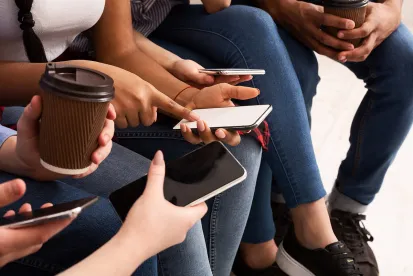Harnessing the power of social media to market products and services is now commonplace, and can take a number of forms, including paying social media "influencers" to create content promoting products, reposting content created by unpaid consumers (known as "user-generated content"), and posting original content on a business's own social media account. In the age of TikTok and Instagram Reels, such content often consists of video synched to music.
Companies capitalizing on popular trends by using music in this manner may be vulnerable to claims of copyright infringement if they do not first obtain a license from music copyright owners. A common misconception is that the use of popular music is authorized by social media platforms themselves, such as TikTok, which enables users to search for music and easily add it to videos. Indeed, many of the most popular social media sites have in recent years entered into licensing agreements with many of the major record labels and music publishers that permit the platforms' users to synch copyrighted music to their videos.i
However, and although the terms of these agreements are closely guarded secrets, these licenses generally do not extend to commercial uses. Indeed, Facebook and Instagram make this clear in their terms and conditions.ii And, in May of 2020, TikTok introduced their Commercial Audio Library, a royalty-free library of music pre-cleared for commercial use, "so businesses don't have to go through the lengthy process of obtaining licenses on their own."iii However, because the platforms in most cases do not prevent commercial accounts from uploading or reposting videos containing popular music, the onus is on the account holders to ensure any such use is properly licensed.
Generally, that means obtaining — and paying for — two separate licenses for each piece of music used: one from the owners of the copyright in the musical composition and one from the owners of the copyright in the sound recording. While this can quickly become expensive, especially for a company with a robust social media presence, businesses that neglect to obtain the necessary licenses may find themselves facing considerably more costly claims for copyright infringement. For businesses unwilling to pay to license popular music, the most prudent course would be to stick to using (albeit less recognizable) royalty-free music available through libraries such as TikTok's Commercial Audio Library.
Once a claim for music copyright infringement is asserted, a business using unlicensed music on social media would be wise to promptly take down or remove the audio from allegedly infringing content, mindful of any obligation to preserve the infringing content under state and federal rules that may require preservation of evidence. Failure to preserve the content may subject litigants to sanctions, potentially including adverse inferences that could harm the party's chance of defeating the claims, limiting damages, or negotiating a favorable settlement.iv
Even in clear-cut cases of infringement, determining the appropriate amount of damages can be a nebulous proposition. Under the Copyright Act, a plaintiff may elect between (1) statutory damages, capped at a maximum of $30,000 per work infringed, or $150,000 per work in the case of willful infringement, and (2) actual damages, plus any profits of the infringer attributable to the infringement.v One method of determining actual damages in cases of music copyright infringement is to evaluate what a willing buyer would have paid a willing seller to license the work for the use made.vi At least one court has held that such a determination must be based on the actual use made of the copyrighted work, even if the copyright owner would not have licensed it for that particular type of use.vii Thus, where the copyright holder seeks actual damages, fixing the amount of a hypothetical license fee is necessarily a fact-specific inquiry that must take into account, among other things, the length of the audio clip used, the length of time the post was available to the public, and the degree to which the visual and audio components were intertwined (for example, music merely playing in the background versus a video of someone lip-synching song lyrics).
In the absence of comparable licenses to serve as an appropriate benchmark, determining the fair market value of the use made can be challenging. By seeking a license in the first instance, the potential licensee can determine whether there is a license fee the copyright holder would accept that the licensee would be willing to pay, while avoiding the pitfalls that may arise from an unlicensed use.
FOOTNOTES
i See, e.g., J. Clara Chan, Snap Strikes Licensing Deal With Universal Music Group to Bring Entire Catalogue to Snapchat, Hollywood Reporter, June 24, 2021; Caleb Triscari, Universal Music Group strikes licensing deal with TikTok, The Music Network, February 9, 2021; Ethan Millman, TikTok Has a New Deal With Sony Music to Promote More Sony Artists, Rolling Stone, November 2, 2020; Facebook Signs “Holistic” Licensing Deal with Warner Music Group, Music Business Worldwide, March 9, 2018.
ii See Music Guidelines, FACEBOOK, https://www.facebook.com/legal/music_guidelines (last visited Jan. 13, 2022) (“Use of music for commercial or non-personal purposes in particular is prohibited unless you have obtained appropriate licenses.”).
iii Explore royalty-free music in our new Audio Library, TikTok for Business, December 16, 2021.
iv See Fed. R. Civ. P. 37(e).
v 17 U.S.C. § 504.
vi See Dash v. Mayweather, 731 F.3d 303, 313 (4th Cir. 2013); Davis v. The Gap, Inc., 246 F.3d 152, 166, 171-72 (2d Cir. 2001).
vii See Country Road Music, Inc. v. MP3.com, Inc., 279 F. Supp. 2d 325 (S.D.N.Y. 2003); see also Davis, 246 F.3d at 166, n.5 (noting that “the fair market value to be determined is not of the highest use for which plaintiff might license but the use the infringer made”).




 />i
/>i

